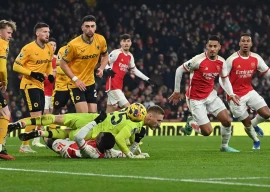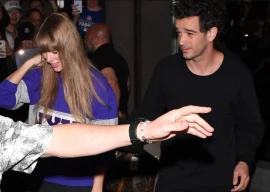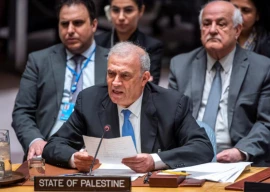
KARACHI:
When former Pakistani government hinted that it is going to liberalise trade with archrival India, the Pakistani auto industry was on the forefront to oppose any such move. However, after two years, not only has the harsh opposition from auto industry diminished but it also seems to see swift progress on issues pertaining to trade with India.
Despite all this change of heart of local auto industry, Pakistan stands exactly where it was in December 31, 2012 – the date that it fixed to complete the procedure of giving most favoured nation (MFN) status to India.
The local auto industry has been fearful that Indian automakers will dump their products in Pakistan leaving them uncompetitive because of their big industry size and economy of scale, whereas, they will have fewer opportunities in India because of the problems of non-tariff barriers (NTBs).
After initial opposition to the very idea of liberalised trade with India, car assemblers of Pakistan are willing to import parts that are completely knocked down (CKD), but are opposing imports of completely built units (CBUs).
The idea to import major car parts from India is feasible because it will reduce the cost of production of cars. Pakistan imports car parts from Thailand and Japan that can be easily imported from neighbouring India owing to its proximity with the country.
Although former government failed in granting the MFN status to India in spite of fixing the final date, Pak Suzuki Motor Company – the biggest player in four-wheeler market with over 60% market share – is hopeful that the new government of Pakistan will improve trade relations with India.

Pak Suzuki looks more enthusiastic unlike the other two carmakers Honda Atlas Motors and Indus Motors because of Suzuki Maruti, an affiliate of Suzuki Japan with over 50% market share in India from where it can import cheap parts for its cars in Pakistan.
Indian auto part makers are willing to transfer latest technology to their counterparts in Pakistan and this will be a win-win situation for both carmakers and auto parts makers in Pakistan, Managing Director of Pak Suzuki Motor Company Hirofumi Nagao told The Express Tribune in May.
Pak Suzuki discontinued its Suzuki Alto from July 1, 2012 when government of Pakistan made compliance of Euro II emission standards mandatory for all the car producers in the country. The company not only wants to import Alto engines from India but also launch new models especially in small engine category with the help of cheaper Indian components.
Pakistan has to move forward consistently in trade with India. Last year, there was a big hype of trade with India but for the last 6-7 months, we just forget this important issue, an official of Indus Motor, the makers of Toyota Corolla said.
Indus Motor officials recently went to Japan where they discussed the developments in Pakistan-India trade with their parent company, Toyota Japan.
“We have requested Toyota Japan to equally support both of its affiliates in India and Pakistan because some car components of Toyota cars are cheap in Pakistan and some are cheap in India. So both of Toyota affiliates will grow if they collaborate with each other,” he added.
Auto parts makers – the other important stakeholder other than carmakers in auto industry – say, that trade with India is difficult owing to widespread mistrust between India and Pakistan and NTBs that discourage Pakistani exports in India.
Auto parts makers say that they are ready for joint ventures with India auto parts makers, but they still look much more concerned if compared to automakers on trade with India.
On the other hand, Indian government says that there are no Pakistan specific NTBs in India and that it is bringing swift changes in systems especially at Lahore-Wagah route to facilitate bilateral trade.
Like other industries, auto industry is closely watching how Nawaz Sharif’s government is going to take forward trade talks with India and especially when he gives MFN status to the archrival.
Published in The Express Tribune, July 22nd, 2013.
Like Business on Facebook, follow @TribuneBiz on Twitter to stay informed and join in the conversation.
COMMENTS (12)
Comments are moderated and generally will be posted if they are on-topic and not abusive.
For more information, please see our Comments FAQ




























































First of all I would like to correct the other posters here, who are showing their pro-pakistanism without even thinking how to the auto industry works. It is time to open your eyes and understand the unfortunately state our auto industry is in. Realizing our current state is the first step towards progress!
Do you guys even have any idea where our auto industry stands ?. There is little competition and we are assembling -note the word assembling not manufacturing- obsolete cars with zero safety or environmental standards. Japanese manufacturers, especially Paksuzuki, are very sharp and they are not transferring any technology to Pakistan for the past twenty years as they have formed a lobby which enjoys government protection to the maximum extent. Paksuzuki was even against allowing new assemblers to enter the local industry (despite the fact that it would bring competition and create jobs).
Imports of components from India will simply be a cheaper substitute for imports from Japan or Thailand.
Keep defending the mafia auto industry (which by the way is serving Japanese interests more than Pakistani) under the false pretext of nationalism and I guarantee you there will be new assemblers here and you guys will still have only 1 small car, the mehran, for the next 20 years or more....
get india cards, they are most suitable to pak conditions..
@Indian, this is a discussion on MFN status and trade relations between the two countries. No need to show your jingoism. There is a time and place for showing your patriotism.
the only thing that raised my eye brows was that pakistan bought euro 2 norm so recently. india is on the verge of bringing out euro 5. so keeping this in mind, an engine from india would be of much better efficiency and technology as compared to pakistan.
@Azeem Your argument applies to all countries we trade with especially China. Should we stop trade altogether ? We should be welcoming increased trade with India (they are our neighbor and closer to us culturally than any other country), it will force inefficient Pakistani companies to improve their processes, those which can't improve should get out of the business. There is no need for PK consumers to line the pockets of companies who can't run a business properly. It would be extremely useful for Pakistani consumers, who would be able to get some stuff cheaper. It will also improve relations of both countries in the long run.
Moreover you can find lot of buses and trucks in GCC countries are from Tata or Eicher Indian brands.
An auto industry is vital for the economic development of any nation. The jist of this article is that basically its a win win situation for Japanese auto makers and thier Indian partners. A more practical solution that is in favor of Pakistan is to introduce more car manufacturers in Pakistan to assemble cars here and basically break the existing cartel of the big 3 Japanese auto manufactures.
Pakistan must never for its own economic interests provide India with MFN. Never!!!! Btw I am not an Indian hater rather an economist who wants to serve our own national interests.
Most of the 100cc bikes in GCC countries are made in india TVS or Bajaj or Hero honda.Proud to be an Indian
@pathan: yes but we pay 2 million to local economy, do you want to pay 1.5 million to indian workers who will spend salary on indian restauratns and indian markets ?
pakistan imports 4 times as much from india, as india does from pak. MFN is not good for pakistan, it will trap pakistan into indian economic hedgemony and pakistans politicians wont be able to decide its policies independently of india
Indus motors has been fleecing theor customers for too long! Its Amazing people pay almost RS 2 millions for a shabby GLI Corolla!
Pakistani market will flood with made in India cars from all major manufacturers including toyota,general motors,suzuki,bmw,benz,hyundai,tata,mahindra etc and also in the case to trucks.The customer will be much benificairy of there selection of items depending upon there pockets.It will be cost effective and high quality products.